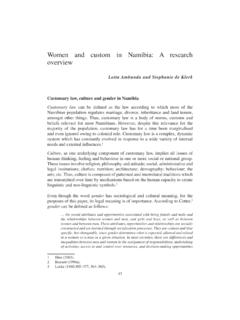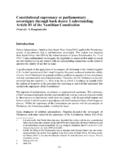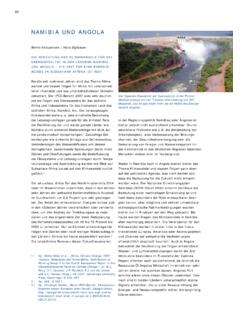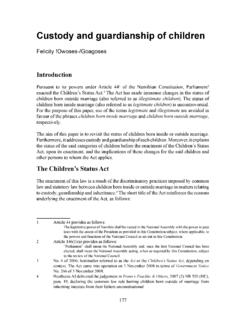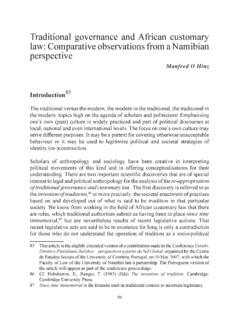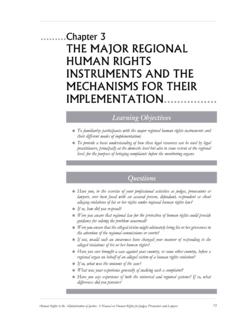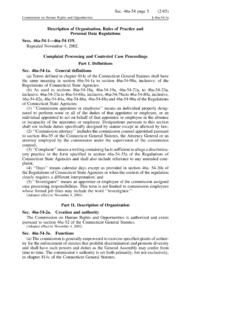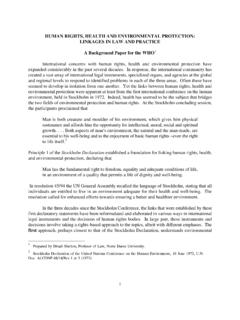Transcription of The implementation of international and regional …
1 The implementation of international and regional human rights instruments in the Namibian legal framework Francois-Xavier Bangamwabo Introduction human rights violations occur within states rather on the high seas or in outer space outside the jurisdiction of any one Thus, it follows that effective protection and enjoyment of human rights has to come from within the state. True, the international human rights system does not place human rights abusers in political bankruptcy, nor does it take over the administration of recalcitrant states in order to assure the enjoyment of rights and/or compensate the victims of human rights violations. On the contrary, the international human rights system seeks to persuade or put pressure on member states to meet their international obligations under human rights instruments that they have ratified or to which they have acceded.
2 There are only two ways through which states can comply with their legal international obligations as contained in treaties: firstly, by observing or respecting their national laws (constitution or statute law) which are consistent with international norms; and secondly, by making those international norms or obligations part of the national legal or political order, that is, they become domesticated (internalised or incorporated). The domestication of these international norms or obligations is the main focus of the current research, with an emphasis on Namibian legal system. Thus, this paper seeks to address the following issues: How does Namibia meet its obligations under ratified treaties? What are the measures or policies taken by the Namibian state to implement or comply with its international obligations as contained in ratified human rights instruments?
3 What is the role of domestic courts in this regard? 349 See Steiner, HJ, P Alston & R Goodman (Eds.). 2000. international human rights in context: Law, politics, morals (Second Edition). Oxford: Oxford University Press, p 987. 165. The implementation of international and regional human rights instruments One thing needs to be kept in mind from the outset: this research is not concerned with human rights violations within Namibia; rather, the thrust is on the domestication and implementation of some major human rights instruments, as ratified or acceded to by Namibia. Before entering the hot waters of the debate, it is worth examining, albeit very briefly, the concept of domestication of international human rights law, its incorporation into national law.
4 Domestication of international human rights law As stated earlier, the onus is upon a national legal system to determine the status and force of law which will be accorded to treaty provisions within such legal system. Indeed, it is only when a human rights instrument and its provisions have become part and parcel of domestic law that national courts and quasi- judicial bodies will be able to apply them to cases brought before them by private individuals or organisations. Traditionally, scholars posit two approaches in respect of the reception of international law into the national legal system, characterising countries as either monist or Monists view international and national law as part of a single legal order. Under this approach, international law is directly applicable in the national legal order.
5 There is no need for any domestic implementing legislation: international law is immediately applicable within national legal systems. Indeed, to monists, international law is superior to national This approach is common in France, Holland, Switzerland, the USA, many Latin American countries, and some francophone African countries. It is worth noting that Namibia, through Article 144 of its Constitution, has adopted the monist 350 (ibid.). 351 See also McDougal, Myres. 1959. The impact of international law upon national law: A. policy-oriented perspective . South Dakota Law Review, 4, 25:27 31. 352 Article 144 of The Constitution of the Republic of Namibia reads as follows: Unless otherwise provided by this Constitution or Act of Parliament, the general rules of public international law and international agreements binding upon Namibia under this Constitution shall form part of the law of Namibia.
6 Thus, all human rights instruments ratified or acceded to by Namibia are part and parcel of its domestic law and should be applied as such, unless they are in conflict with an existing Act of Parliament, or where they are not in conformity with the supreme law of the land, the Constitution. 166. The implementation of international and regional human rights instruments Dualists, on the other hand, view international and national law as distinct legal orders. For international law to be applicable in the national legal order, it must be received through domestic legislative measures, the effect of which is to transform the international rule into a national one. It is only after such a transformation that individuals within the state may benefit from or rely on the international now national law.
7 To the dualist, international law cannot claim supremacy within the domestic legal system, although it is supreme in the international law legal system. This method of incorporation is commonly applied in the United Kingdom, Commonwealth countries, and most Scandinavian jurisdictions. While the monist/dualist debate continues to shape academic discourse and judicial decisions, it is unsatisfactory in many respects. The debate focuses on the source or pedigree of norms, and ignores the substance of the norms at issue. By creating a dichotomy between norms on the basis of their sources, we risk being blinded from assessing the merits of the contents of the norms at issue. international and national law have traditionally addressed relatively different issues: the former concentrating on the relationships among states, and the latter on relationships among persons within national jurisdictions.
8 In recent times, however, there is a gradual convergence of interest, and the ultimate goal of both systems is to secure the well-being of individuals. This common goal manifests itself in human rights law, environmental law, and commercial law, areas where there is increasing interaction between national and international Thus, international and national law have a lot in common, and an attempt to compartmentalise or isolate them will be analytically flawed and practically inapposite at present. The theoretical problems with the monist/dualist paradigm aside, the relationship between international law and national law has important practical implications for both systems and their subjects. The relationship determines the extent to which individuals can rely on international law for the vindication of their rights within the national legal system, and has implications for the effectiveness of international law, which generally lacks effective enforcement mechanisms.
9 353 Thus, private individuals have become subjects of international human rights law, particularly in regard to the recent creation of ad hoc UN international Criminal Tribunals to prosecute individuals who have committed crimes against humanity, war crimes, genocide, and other violations of international humanitarian law. Among these are the international Criminal Tribunal for the Former Yugoslavia; the Rwanda Tribunal in Arusha, Tanzania; the Special Court for Sierra Leone; and the Hybrid Chambers for Cambodia. 167. The implementation of international and regional human rights instruments In a nutshell, it is worth remarking that international law does not dictate that one or the other of the aforesaid methods should be used. Thus, what matters most is the internalisation of international legal obligations within national laws, and their subsequent implementation by domestic courts and quasi-judicial bodies.
10 It follows, therefore, that the method by which treaties become national law is a matter in principle to be determined by the constitutional law of a ratifying state, rather than a matter ordained by international legal The benefits of incorporation are self-evident. The fact that international human rights instruments are internalised into domestic law gives national authorities the opportunity to afford redress in cases of human rights violations before such cases are taken to regional or international judicial or quasi-judicial fora. This way, protracted proceedings in a forum that is both remote from and unfamiliar to the claimant can be spared. The settlement of litigations on the national level, saving both time and money, always remains the preferable option.


